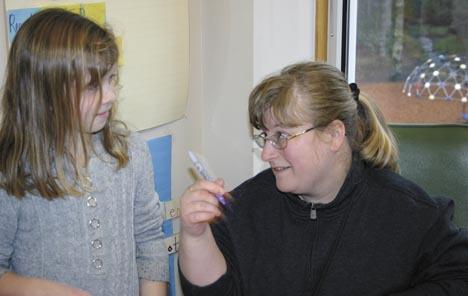Islander Alisa Church made her way through the crowded, bustling halls of Chautauqua Elementary School on a recent afternoon, moving slowly and methodically as she sang out greetings to pint-sized students.
It’s a scene that has repeated itself five days a week, for close to five years now, as Church has become one of Chautauqua’s most reliable, well-known and devoted classroom volunteers.
During that time, she has watched hundreds of children pass through the corridors of the elementary school. But the children have also watched Church, learning, along the way, a lot from her about the realities and challenges of living with a disability.
Church, 31, is not much taller than many of the students at Chautauqua. Vivacious and outgoing, she sports a no-nonsense ponytail and a quick smile. Her bright eyes sparkle behind a pair of wire-framed glasses.
She also walks haltingly, with the help of two canes, because she has spina bifida, a developmental birth defect in which the backbone and spine do not close before birth.
According to Church, many children she meets at Chautauqua don’t immediately understand the reason for her limited mobility.
“One girl came up to me and said, ‘Are you going to be off your crutches soon?’” Church explained. “Another one asked, ‘Does your leg feel better?’ Most kids don’t understand someone who is permanently in a wheelchair.”
And so, in addition to helping students with math, reading and spelling, one of the things Church does at Chautauqua is help children learn about spina bifida.
For the past two years, Church has made a presentation in Sharon Boyer’s classroom, explaining the facts about her condition and patiently answering students’ questions. She’s become an emissary for the disability, a role she’s taken on because of her concern that the condition is not well understood.
“If I could tell the whole world about my disability, I would,” Church said.
Boyer, whose classroom this year includes a blend of second and third-graders, described Church’s presentation as “very matter-of-fact,” and added that her students have been eager to listen to Church’s talk and learn about spina bifida.
“They always have intelligent questions,” she added.
But helping educate children about spina bifida is only one of the roles Church plays at Chautauqua. Most of her time is spent like that of any other teacher’s volunteer — helping Boyer with the workaday tasks of her classroom, such as grading papers and working one-on-one with students who need a little extra help.
“They can come to me when they have a problem, and I can talk them through it,” Church said.
Boyer described Church’s relationship with her students in glowing terms.
“She’s very empathetic, but she also wants to see the students do the best they can, because she has,” Boyer explained.
Church also spends three days a week at the school helping at Lunch Club, a drop-in program that provides students with an indoor alternative to lunch recess.
Held in a third-floor classroom, Lunch Club includes activities such as chess, knitting and card games.
“She’s my eyes and my ears,” said Diane Brenno, a Chautauqua staff member who has been in charge of Lunch Club program for the past eight years.
Church laughed as she defined her role at Lunch Club in more dramatic terms.
“I try to help keep sanity in the room,” she said.
Brenno said Church also brings a special empathy to her work with young Lunch Club attendees, some of whom have developmental disabilities.
“She’s so sensitive to the kids and their needs,” Brenno explained. “I’m sensitive too, but I don’t have on the same pair of glasses that she does. So several times, in the course of working together, we’ve had some serious discussions because I don’t really understand, and she sets me straight.”
Church, who attended kindergarten through 12th grade at Vashon’s public schools, credits several of her own teachers — one of whom was Sharon Boyer — with providing her with the motivation to work with children.
“They are the reason I’m doing what I do now,” Church said.
She singled out Helen Frohning, a legendary Vashon teacher who died several years ago, for special praise.
“She was my third-grade teacher,” Church said, “and that was a terrible year for me. I was in a body cast for about two-and-a-half months, because of hip surgery, and I also had the chicken pox. But Helen Frohning came to my house every day after school, with her dogs, to teach me what she had taught the other kids at school that day, because she didn’t want me to miss anything. She was so good to me, and I took that as a huge example.”
Church said her years of volunteering at Chautauqua have passed quickly, and she hopes to continue helping at the school.
“I’ll be there as long as I’m needed,” she said.
And Diane Brenno, for one, thinks that will be a very long time.
“She helps this place, in an unspoken way, to give the kids a sense of security,” Brenno said. “Alisa is full of nothing but love.”


